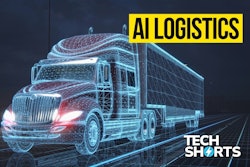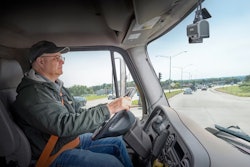To build or to partner? That’s the question every tech company asks itself when it’s looking to expand its offerings.
While some form integrations, Fleetworthy has decided to make another acquisition. The fleet management provider has acquired Haul, a provider of AI-powered compliance and safety automation technology.
Haul got its start in 2020, formed by Tim Henry and Toan Nguyen Le, who met in 2016 during their time working for Uber Freight and now will join Fleetworthy’s leadership team.
Henry said the cofounders started building the Haul platform to support different areas of a fleet’s operations, including compliance, maintenance and safety, targeting smaller fleets with fewer than 100 power units, though the company also works with larger carriers like J.B. Hunt and Ryder.
Mike Precia, president and chief strategy officer at Fleetworthy, said the two companies have many commonalities, but bringing Haul under the company umbrella also fills some gaps while expanding Fleetworthy’s market reach.
“If you look at where we were going from a technology (and) AI perspective, a large percentage of things that we were planning on doing, we complete by this acquisition,” Precia said.
Forming a connection
Fleetworthy offers technology for fleets, but it also has a client services arm that acts as an extension of the company’s fleet customers’ compliance and safety departments.
“We understand that there's a lot of data coming out of the cab and coming from all sorts of different data sources. It's hard for carriers to keep up with all that,” Precia said. “Our goal was, if we can be best in class in technology (with) an agnostic product that can be bolted on to some of their legacy systems, and if we can provide people that … (and) understand the data better than them, then we could be a leader in the industry.”
He said that’s why Fleetworthy began looking for like-minded vendors for acquisition opportunities.
Toll management and payment platform Bestpass acquired Fleetworthy Solutions in late 2023. In 2024, Bestpass-Fleetworthy Solutions acquired Drivewyze, which provides a weigh station bypass system and in-cab driver safety alerts. The company later rebranded to Fleetworthy. Haul will continue to operate under its brand as Haul by Fleetworthy.
[RELATED: Fleetworthy acquires parking violation management company]
Haul’s AI was a key draw for Fleetworthy, Precia said.
Haul uses a large language model to apply AI to its platform.
One area of focus is inspections, in which the platform can run roadside inspections through its recommendation engine, understand what happened during the inspection and, via integration with a learning management system, recommend training for a fleet to assign the driver.
The other focus is document extraction, in which the platform leverages machine learning and computer vision to classify documents and overlay a digital compliance workflow. For example, a driver can take a picture of their medical card and upload it to the system, which then extracts the data that was previously manually entered by a person. The compliance workflow then takes over and audits the document.
“The majority of fleets who are less than 10 power units typically have to Google a lot, hire a third-party organization or hire someone,” Henry said. “We're really trying to bring the notion of a safety manager (and) compliance manager in a box to the masses.”
The AI Element
Precia said Fleetworthy will utilize Haul’s AI, not only for the technology it supplies for its fleet customers, but also to strengthen its client services team to make it more efficient and effective at serving those fleet clients.
Henry said Haul has built a lot of automation around fleet compliance, using different types of AI tools and techniques in a way that serves the culture of the industry. But that culture remains driven by people.
“We're still a people industry. At the end of the day, if a truck is late, what typically happens is someone picks up the phone, calls up the carrier, and says, ‘Hey, where's the shipment,’” Henry said. “That's something that should not be underestimated: how interpersonal this is.
“That's why Fleetworthy has stood out from other brands is really that client services arm that they have that has really made them a trusted partner for a lot of fleets,” he added.
Precia said Haul’s AI tools will also help Fleetworthy’s client services team manage the projected growth the company expects from this acquisition. Fleetworthy has historically served larger carriers, but this transaction broadens its reach to Haul’s smaller carrier client base.
[RELATED: What consolidations among tech providers mean for their trucking customers]
It’s “a double effect of expediting things we were trying to build ourselves and arming our client services team here in the U.S. with tools that are going to make them more efficient,” he said. “The other thing is not having to turn our back to the smaller end of the spectrum of customers because, now with Haul, they can start with a self-service tool that's powered by AI machine learning. As they graduate to needing support, like our holistic solution, they won't have to leave and find another vendor. They can grow with us.”
Size matters
It may be a different interface for carriers of different sizes, Nguyen Le said, but the solutions are the same.
Precia said the cool thing about the trucking industry is, while their needs in regard to how carriers interreact with vendors may be different, the regulations are exactly the same; carriers of any size all have concern when it comes to audits or nuclear verdicts.
He said Fleetworthy has the footprint to support larger carriers that have national operations with robust technology and expertise across 50 states with an infrastructure of understanding analytics and doing quarterly business reviews at a cadence that makes sense. For the small carriers, or those that are just starting on their authority, the acquisition of Haul means Fleetworthy can help them, too, he said.
“This unifies a market. Although the carriers themselves might be varying in size, they all are made up of individuals that get in a cab and want to get home safely every day,” Precia said. “Our ability to address both ends of the market, both technologically and with the services we provide, really excites us because now there really is no hurdle or barrier to entry for the largest of the large carriers or the smallest of small carriers.”
A smaller fleet with fewer than 25 power units can create a Haul account to start with a 14-day free trial and input their credit card information if they want to move forward, never chatting with anyone, Henry said. A fleet with 50 to 100 units may like the Haul software but not have the team to implement it. That’s where Fleetworthy’s client services team can help. And a larger fleet may implement Haul within its own tech stack.
It's the same tooling underneath but different interfaces, Henry said.
Looking forward, Precia said Fleetworthy could potentially integrate Haul’s AI capabilities with its other services, including Bestpass and Drivewyze, as the company learns how it can use AI and machine learning in regard to the driver and asset regulatory landscape.
“We want to apply that same rigor toward bypass and tolling, and there are some interesting things that we can start offering that our customers are asking for when it comes to insights to behavior and how we can do things more efficiently and effectively,” he said. “We plan on applying (Haul’s) knowledge to that part of our business as well so that we can continue to deliver right-sized AI and machine learning functionality that will suit the market.”











